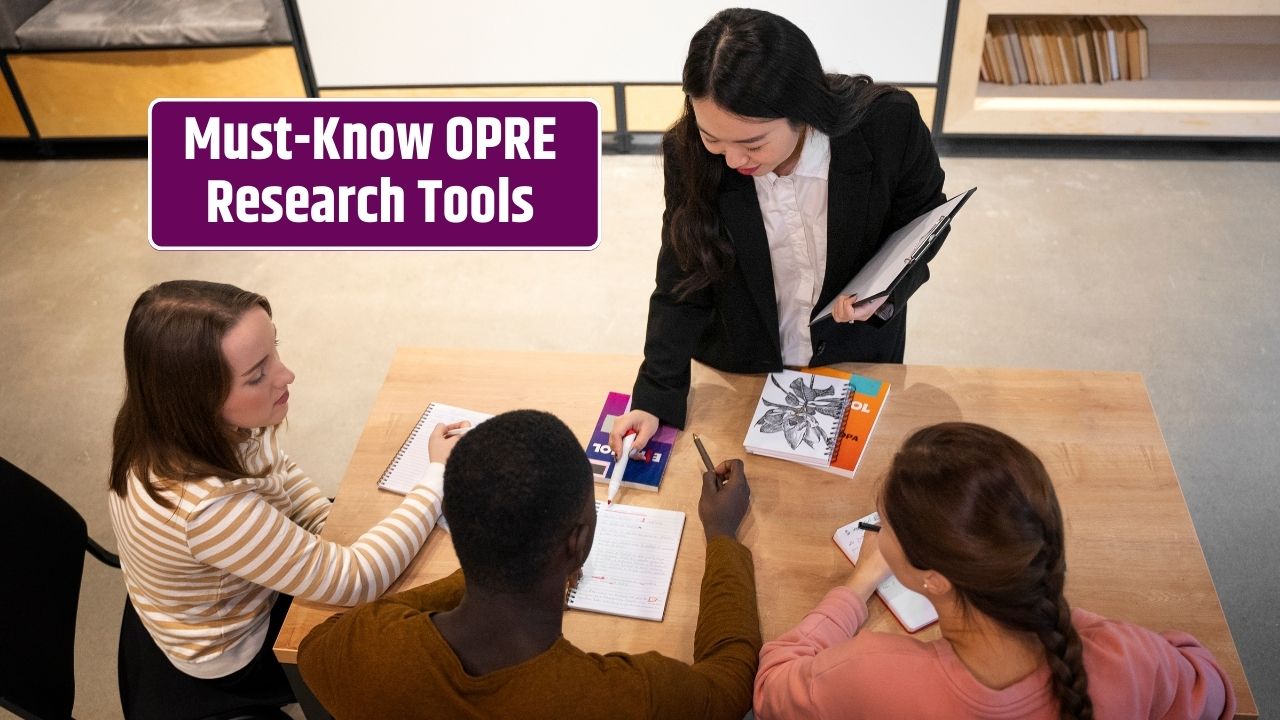The Office of Planning, Research, and Evaluation (OPRE) doesn’t just fund and conduct research—it also develops and shares powerful tools that help social policy researchers evaluate, interpret, and improve human services programs. Whether you’re working in academia, government, or the nonprofit sector, OPRE’s resources can sharpen your methods, streamline your data use, and ground your work in evidence.
Here are the top OPRE tools and resources every social policy researcher should know—and how they can support your work in designing better policies and services.
Table of Contents
1. Pathways to Work Evidence Clearinghouse
This interactive database helps researchers and practitioners identify evidence-backed strategies that support employment and economic mobility among low-income populations.
Key Features:
- Searchable by population, setting, or service strategy
- Summarizes intervention effectiveness using a clear, tiered evidence framework
- Offers easy-to-digest program snapshots and outcomes
Ideal for researchers designing interventions or writing grant proposals, the Pathways Clearinghouse saves time by translating complex evaluations into actionable insights.
Explore it: https://pathwaystowork.acf.hhs.gov
2. OPRE Methods Briefs and Reports
OPRE publishes a rich library of methods papers that dive into the “how” of high-quality evaluation in human services. These resources are especially valuable for researchers working on:
- Implementation science
- Equity-focused evaluation
- Mixed methods designs
- Use of administrative data
- Causal inference in non-experimental settings
Examples of Notable Titles:
- Equity in Research and Evaluation
- Using Administrative Data in Program Evaluation
- Practical Strategies for Mixed Methods Implementation
These documents translate complex techniques into accessible, practical guidance you can apply to real-world projects.
Browse: https://www.acf.hhs.gov/opre
3. TANF Data Innovation (TDI) Toolkit
Designed for state and local agencies but incredibly useful for researchers, the TDI Toolkit offers resources for using administrative data to improve TANF programs and employment services.
Tools Included:
- Data governance and privacy templates
- Guides for linking and managing cross-agency data
- Case studies of successful state-level data use
The toolkit supports the secure, ethical, and strategic use of large-scale data, helping researchers collaborate with agencies more effectively.
Access it: https://www.acf.hhs.gov/opre/project/tanf-data-innovation-tda
4. Head Start Program Performance Reports and FACES Data
OPRE manages the Family and Child Experiences Survey (FACES)—a nationally representative study of Head Start children, families, and classrooms. The dataset is rich with longitudinal, demographic, and developmental variables ideal for secondary research.
Why It Matters:
- Access to clean, structured public-use datasets
- Companion reports and briefs provide context for data use
- Includes unique data on classroom quality, family involvement, and child development
These data are invaluable for researchers focused on early childhood development, program equity, and educational interventions.
FACES data available via Research Connections
5. OPRE Innovation and Improvement Projects
OPRE supports several technical assistance and innovation initiatives that provide open-source tools for applied research and evaluation. These projects often produce:
- Logic model templates
- Implementation readiness assessments
- Cost analysis calculators
- Evaluation planning guides
Key Projects:
- Project IMPROVE – Tools for continuous quality improvement in TANF
- Learn Innovate Improve (LI²) – Human-centered design strategies for social programs
- Child Care and Early Education Policy and Research Analysis (CCEEPRA) – Tools for early care researchers and evaluators
These tools help researchers bridge design and practice, making their evaluations more adaptive, inclusive, and effective.
6. OPRE Evaluation Technical Assistance Resources
OPRE regularly collaborates with grantees and researchers to publish evaluation planning guides and technical assistance materials, including:
- Evaluation readiness checklists
- Strategies for stakeholder engagement
- Frameworks for equity-centered research
These are particularly useful for community-based organizations or early-career researchers who want to strengthen the quality and credibility of their work.
Summary Table: OPRE Tools at a Glance
| Tool/Resource | Primary Use | Best For |
|---|---|---|
| Pathways Clearinghouse | Evidence synthesis on employment interventions | Program design, policy reviews |
| OPRE Methods Briefs | Practical guidance on research methods | Evaluation design, methodological support |
| TANF Data Innovation Toolkit | Administrative data management and analysis | Data analysts, agency partnerships |
| FACES Data & Reports | Early childhood program data | Secondary research, education policy |
| OPRE Innovation Projects | Hands-on tools for implementation and improvement | Human-centered evaluation, TA work |
| Evaluation TA Materials | Readiness and stakeholder engagement | Community orgs, early-stage evaluations |
FAQs
Are OPRE tools free to access?
Yes, all OPRE resources are publicly available online.
Can I use OPRE datasets for academic research?
Yes. Many datasets like FACES are accessible through approved portals for secondary use.
Do I need special software to use these tools?
Most are available in user-friendly formats (PDFs, Excel, or web-based). Some datasets require statistical software for analysis.
Are these tools updated regularly?
Yes, OPRE frequently updates tools and briefs based on new research and federal priorities.


























